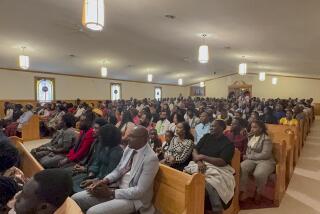Haitian family in Port-au-Prince has no choice but to join exodus
- Share via
Reporting from Port-Au-Prince, Haiti — There had been a few tears and doubts, but a week after Haiti’s devastating earthquake, the Theodore family had made a decision. Their bags were piled next to the collapsed canopy of a Texaco station, and they waited Tuesday for a road-worn bus passing by to take them away.
Everything truly important, they knew, was with them: Pierre, his wife, Maggie, their two children and a blond doll nearly as tall as 3-year-old Victoria -- her gift from Santa Claus not even a month ago.
Like tens of thousands in this capital, and like most of their neighbors, the Theodores had run out of options. After sleeping on the street outside their flattened seven-room apartment for the last week, scraping for food and worried about security, they were headed for Pierre’s mother’s home in Gonaives, a region devastated by flash floods several years ago.
“If you have a place to go to in the country, everyone’s got to go,” Maggie Theodore, 33, said. “I didn’t want to leave here. But what choice do I have?”
The exodus began shortly after the earthquake a week ago, and every day more families in battered Port-au-Prince are making the same decision. Buses piled high with luggage clog the roads leading out of town. And, bus drivers lament, although they leave the city loaded with passengers, they always return empty from the countryside.
The departures have been welcomed by the Haitian government and aid agencies.
Gregory Mevs, a prominent Haitian businessman tapped to manage scarce fuel supplies in the capital, said he had made it a priority to get gasoline to truck and bus operators in recent days, hoping to encourage people to leave the city for regions where food and shelter were more plentiful.
“In the provinces, they can pick avocados and eat from the farm,” he said. And, not incidentally, departures for family lands far outside the city will help reduce the massive demand for emergency food and shelter that relief agencies have so far been unable to meet.
Officials originally estimated that 200,000 of the 3 million people in Port-au-Prince would leave after the earthquake, at least temporarily. But Mevs said he expected that figure to be closer to 700,000, or nearly one in four surviving residents.
At a dusty outdoor bus station near the sea on Tuesday, touts and drivers herded hundreds of passengers onto dozens of brightly colored vehicles, some of which were once yellow school buses. A thick cloud of exhaust hung over the idling buses as luggage was piled high on top.
Paul St. Pierre, 39, who has driven the 80-mile route from the capital to Cap-Haitien for 15 years, climbed onto a full bus of 66 passengers and it crunched loudly into first gear.
Although he had paid $9 a gallon for gasoline -- nearly twice the pre-earthquake rate -- he had decided not to raise the one-way fare for passengers (about $7). And he was allowing passengers who didn’t have the money to nevertheless take a seat. “I can’t leave people who are sleeping in the streets,” he said.
Still, it’s tough for drivers “because we’re full leaving but nobody’s coming back,” he said. All four passengers on his last return trip from Cap-Haitien were coming to help injured relatives travel to the countryside.
The Theodores were leaving town reluctantly, but they felt fortunate to be alive.
Pierre, 32, a Canadian-trained registered nurse, had worked at St. Vincent’s, a children’s hospital, helping build prosthetic devices for children who had lost limbs. (Born without legs, he himself has two prostheses.)
The earthquake destroyed St. Vincent’s two buildings, killing, among others, at least 150 disabled children and two doctors. Pierre had left work just a few minutes before.
His wife and children also escaped injury because they were not at home when the temblor destroyed their apartment. “God blessed my family,” Pierre said.
He opened a small clinic in his neighborhood after the quake, to treat some of the injured. His wife’s twin, who is married to his brother, lived nearby. They and their two children also escaped injury, and both families were making the journey to Gonaives.
“My mother called me and said, ‘Don’t let your family stay there,’ ” Theodore said, so he and his brother’s family decided to leave for a while. Theodore considered staying behind for a few days to continue treating neighbors. But most of his neighbors have already left.
As the families sat on their luggage on a hot afternoon, they were using the Texaco sign that had tumbled to the ground for shade. A few steps away, a fuel tanker truck was wedged under the station’s canopy, a reminder of the force of the magnitude 7.0 quake.
Leaving was difficult for the Theodores and especially their children, Victoria, the preschooler, and Kevin, who is 15.
Asked what she was most sad to leave behind, Victoria held up three small fingers. “My bed, my bedspread and my dresser drawer,” she said.
Her mother said that spending some time in the countryside would be good for the family. Though they would have to squeeze themselves into her mother-in-law’s house, they would at least have shelter. And they wouldn’t have any food worries; the family farm produces manioc, beans and corn.
“I’m sure we’ll be back,” Maggie Theodore said. “But, for now, this is best. We’ve got to remember we’re lucky to be here.”
Times staff writer Tracy Wilkinson contributed to this report.
More to Read
Sign up for Essential California
The most important California stories and recommendations in your inbox every morning.
You may occasionally receive promotional content from the Los Angeles Times.














